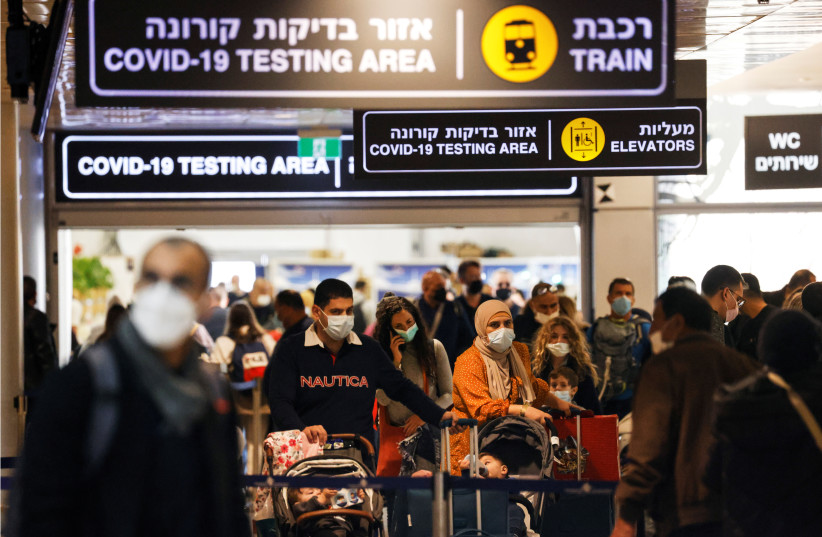As we approach the end of 2021, I had quite the fortunate ability to return to Israel from the United States. Due to the surge of coronavirus and its related variants, I experienced a trip unlike those of recent memory. For many months, it seemed improbable, as the government constantly deliberated entry requirements amid a public-health crisis. Thankfully, as the first degree relative of a lone soldier, I was permitted to enter.
Passing through Jaffa Gate and making my way to the Western Wall, I was struck by the silence and emptiness – unfortunate indicators of the toll the pandemic has had on the citizens of Israel. The cobblestone streets and alleys of the Old City, normally bustling with the immutable hum of residents from all walks of life, often packed shoulder to shoulder, are now mostly barren. My own footsteps echo eerily as I wind into the heart of the city. The stillness serves as a stark reminder of the countless lives lost to this deadly virus, as well as the millions more people who remain in isolation, separated from family and loved ones, not only here, but seemingly everywhere.
I sincerely commend my friends and colleagues in the Israeli government for their aggressive – and mostly successful – steps taken to protect public health and “flatten the curve.” However, the realities of the pandemic and subsequent measures to limit entry into Israel for a variety of reasons have created a significant disconnect between Israel and the global Jewish Diaspora. This challenge is compounded by the age-old scourge of antisemitism, which has reared its ugly head in the form of baseless conspiracy theories blaming and threatening Jews for the proliferation of coronavirus. American Jewry has remained particularly attentive to these developments, having experienced the tragic endpoint of such dangerous ideology, which resulted in murderous assaults on synagogues in Pittsburgh, San Diego and Jersey City.
How can it be that Jews continue to be the target of so much vile discrimination – alleged by some to be the original source and cause of the virus, and at the same time, impacted by the virus as similarly as other communities around the world?
And the seemingly indiscriminate, illogical and ever-changing rules only exacerbate the disconnect, especially between American Jews and Israelis. What has been missing throughout the entire process is empathy. Take, for instance, the challenge described by former MK Michal Cotler-Wunsh, who desperately tried to seek permission for a man to enter Israel only in order to visit his very sick mother. With the restrictions, Cotler-Wunsh could not secure approval for the request, even as the mother’s health rapidly deteriorated. The man was only later granted entry to attend his mother’s funeral service.

If Israelis are allowed to enter Israel from a “red” country – those deemed overwhelmed by the virus – and quarantine for seven days, perhaps foreigners should be able to do the same. American Jews, especially, are not just a passport number, but a critical component of what makes Israel tick. What’s more, the Israeli government understands and recognizes the importance of the Diaspora. But there is an issue of translating it through the bureaucracy as it relates to both policy and how the bureaucracy engages with us and, dare I say, the Right of Return. The current cap on entry may be a well-meaning, epidemiological, and medically educated decision, but it has created a gulf and fissures, and it is quite problematic.
The Conference of Presidents of Major American Jewish Organizations will continue to reinforce relations between the Diaspora and the Jewish state, as well as call out antisemitism wherever and whenever it occurs. No matter the challenge, Israel must remain a sanctuary for Jews from around the world. The State of Israel maintains an implicit contract with the entire Jewish Diaspora, wherein Israel will always be a place of refuge, where there is a safety net and the guarantee of security for all.
But the complications of the COVID-19 pandemic have temporarily suspended this once iron-clad contract. Therefore, it is imperative for all of us to reconstitute this critical relationship, or risk losing the very essence of what sustains the Diaspora and what allows Israel to forever thrive and flourish. The Israeli government, during this time of tragedy and uncertainty, can do its part to bring us together by crafting entry policies that are transparent, consistent, and holistic – and doing so by showing a good dose of empathy and compassion for their Jewish brothers and sisters across the globe.
The writer is CEO of The Conference of Presidents of Major American Jewish Organizations, the senior professional guiding the Conference’s agenda on behalf of its 53 national member organizations, which represent the wide mosaic of American Jewish life. Follow him on Twitter @Daroff
